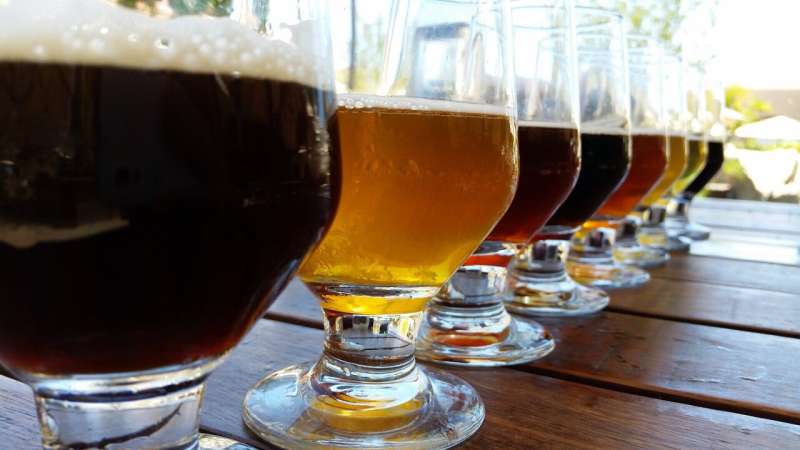This article has been reviewed according to Science X's editorial process and policies. Editors have highlighted the following attributes while ensuring the content's credibility:
fact-checked
peer-reviewed publication
trusted source
proofread
Legal recreational cannabis use and binge drinking is on the rise for older adults, research shows

New research at Columbia University Mailman School of Public Health has examined changes in binge drinking after the implementation of recreational cannabis laws.
Analysis of national survey data from Americans aged 12 and older showed that past-month binge drinking increased overall among people aged 31 and over from 2008 to 2019. At the same time, binge drinking declined overall among people aged 12-30. The results are published online in the International Journal of Drug Policy.
The most substantial declines in binge drinking were observed among people ages 12-20 (from 17.5% in 2008 to 11% in 2019), followed by respondents ages 21-30 (from 44% to 40%). While overall increases in binge drinking were recorded in all U.S. states regardless of cannabis laws among individuals ages 31 and older, the most extensive increases between 2008 and 2019 were noted among people ages 31-40, from 28% to 33%, followed by those aged 51 and over (from 13% to 17%).
While investigating binge drinking prevalence before and after implementation of recreational cannabis laws, the authors observed a 4.8% decrease in binge drinking among people aged 12-20. However, they also noticed an increase after implementation of recreational cannabis laws among those aged 31 and older (with an increase of 1.7% for adults aged 31-40, 2.5% for those aged 41-50, and 1.8% for those aged 51 and older). Until now, research on the relationship between recreational cannabis laws (RCLs) and binge drinking has been limited to data from just a few states, small study samples, and combined age groups.
The National Institute on Alcohol Abuse and Alcoholism defines binge drinking as 5 or more drinks for men or 4 or more drinks for women per drinking session. Binge drinking has been associated with acute adverse outcomes such as motor vehicle crashes and traffic fatalities, criminal legal system exposure, poor academic achievement, and emergency department visits.
The study, one of the first to report associations between binge drinking and recreational cannabis laws in adolescents and adults at a national level, builds on existing literature by using nationally representative data to investigate the potential effects of the changing cannabis policy landscape in all age groups also adjusting for a comprehensive measure of state alcohol policies.
"Our earlier research showed the impact of legalizing cannabis on the perception and availability of cannabis use and changes in alcohol use patterns," said Silvia S. Martins, MD, Ph.D., professor of epidemiology in the Department of Epidemiology at Columbia Mailman School, and senior author.
"The current literature supports two possible hypotheses. The complementary is that both cannabis and alcohol use may increase after cannabis legalization as individuals use these substances together. The substitution hypothesis is that alcohol use may decrease after cannabis legalization, as individuals may use cannabis instead of alcohol when both are readily available. Evidence regarding these hypotheses remains inconclusive, especially regarding how cannabis legalization may impact binge drinking across different age groups," said Priscila Dib Gonçalves, Ph.D., post-doctoral fellow in the Substance Abuse Epidemiology program in the Department of Epidemiology at Columbia Mailman School, and first author of the study.
The researchers make the point, therefore, that more research is needed to understand the incremental change in binge drinking associated with RCLs using nationally representative data across different age groups.
"We believe that future studies should examine the relationship of other environmental and individual factors, such as perceived risk, disapproval, availability, peer drinking, alcohol expectancy, among binge drinking and recreational cannabis laws in this age group," noted Dib Gonçalves.
"It is worth noting that cannabis legislation is complex, involving multiple policy decisions, including regulations of supply chain and operation: government monopoly, retail sales, legal home cultivation, advertisement, types of products distributed, prices, and taxes, and each state may have different policies when regulating recreational cannabis use," said Martins. "As the cannabis legislative landscape continues to change in the U.S., efforts to minimize harms related to binge drinking are critical."
More information: Priscila Dib Gonçalves et al, Recreational cannabis legislation and binge drinking in U.S. adolescents and adults, International Journal of Drug Policy (2023). DOI: 10.1016/j.drugpo.2023.104085




















